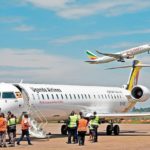The Federal Government has been urged to ensure that its coordinated policies remained critical to air travel recovery just as it has been argued that a COVID-resilient mindset must rise above COVID-free.
Equally, it has been declared that blanket travel bans would not prevent spread and quarantines for the asymptomatic vaccinated which has been described as ‘an unnecessary burden’.
Speaking with some aviation journalists, a former Assistant Secretary-General of Airline Operators of Nigeria (AON), Muhammed Tukur argued that testing kept travelers with symptoms away from airplanes hence, constant changing of policies must be avoided to prevent confusion and needless turmoil.
While stating that the continued gradual recovery of the sector was expected in 2022, varied region-by-region, Tukur added that each wave of infections often results in a smaller impact on air travel demand.
IN CASE YOU MISSED THESE FROM NIGERIAN TRIBUNE
- ‘Officials initially offered to help but when the number of able-bodied citizens at the centre increased, they left us unattended to’
- Why Ogun Tops List Of ‘Yahoo Boys’ In Nigeria ― Governor Abiodun
- Police, Amotekun after criminals on Lagos-Ibadan expressway
- Suspected cannibal pays N500,000 for boy’s human organs, says ‘that’s my favourite meal, especially the throat’
- Court awards Nnamdi Kanu N1 billion over invasion of his home by military, asks FG to apologise
According to him, as immunity increased, the isolation periods were shrinking and cross-border testing requirements were being reduced despite Omicron’s impact on case numbers.
“The Americas and Europe are poised to rebound once Omicron subsides. Border restrictions rather than vaccine supply will constrain Asia Pacific’s recovery with a China reopening unlocking 40% of international traffic in the region. Just as domestic traffic bounced back in 2021, international flows will reawaken in 2022.
“A structural shift in air cargo has occurred, driven by the pull-forward of e-commerce growth, airlines’ desire to diversify revenue sources, and the need to restart supply chains. Freight tonne kilometers (FTKs) flown are now 9% ahead of 2019-levels with historically high yields.
“Airlines are going freight-forward. Since 2019, there has been a 50% increase in the number of passenger airlines that operate two or more dedicated freighters including diverse business models such as Air Canada, SmartLynx, and SpiceJet. E-commerce revenues are expected to grow $2 trillion by 2025, more than 50% over 2021. Airlines are scrambling to collect their share”.






